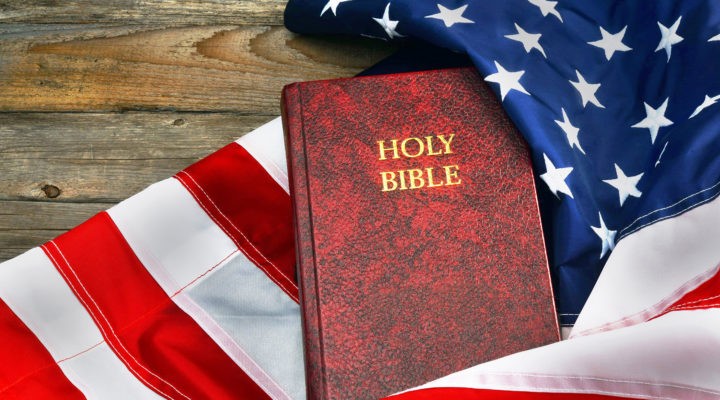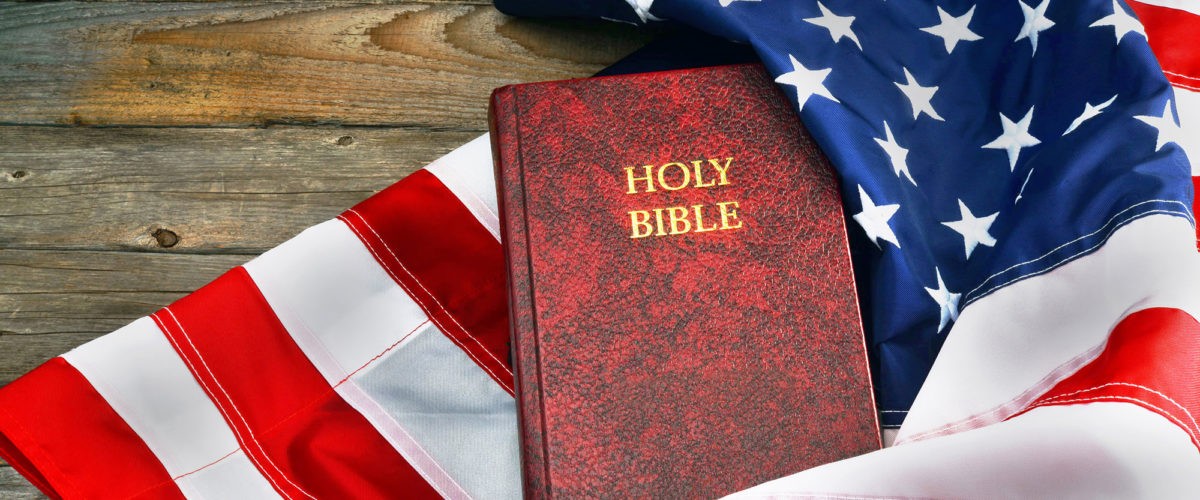Those (military members) who have served through the ages and have drawn inspiration from the Book of Isaiah, when the Lord says: “Whom shall I send? Who shall go for us?” The American military has been answering for a long time. “Here I am, Lord. Send me. Here I am, send me.” Each one of these women and men of our armed forces are the heirs of that tradition of sacrifice, of volunteering to go into harm’s way to risk everything, not for glory, not for profit, but to defend what we love and the people we love.
President Joe Biden spoke these words after the ISIS-K attack on the Kabul airport in Afghanistan on Aug. 26, killing 13 United States service members.
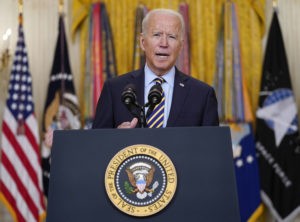
President Joe Biden speaks about the American troop withdrawal from Afghanistan, in the East Room of the White House, Thursday, July 8, 2021, in Washington. (AP Photo/Evan Vucci)
Biden references the Book of Isaiah, specifically chapter six verse eight, to name military service as a divinely sanctioned, prophetic act. Chapter six of Isaiah is God’s calling of Isaiah to the work of a prophet, with Isaiah faithfully answering, “Here am I; send me!” Biden uses this explicit biblical reference of Isaiah following the call of God after stating earlier in his address, “To those who carried out this attack, as well as anyone who wishes America harm, know this: We will not forgive. We will not forget. We will hunt you down and make you pay.”
Biden, in no uncertain terms, names military vengeance and acts of war as sanctioned by God and the call of a prophet of God. Biden’s use of explicitly religious language to unite the American people in support of war is far from the first time a United States president has done so. There is a long history of using such language to perpetuate war, especially after an attack.
In his annual address to Congress in January 1942, not long after the Japanese attack on Pearl Harbor, President Franklin Delano Roosevelt left no question about what the United States was fighting for, and, even more importantly, why it was fighting:
Our enemies are guided by brutal cynicism, by unholy contempt for the human race. We are inspired by a faith that goes back through all the years to the first chapter of the Book of Genesis: “God created man in his own image.” We on our side are striving to be true to that divine heritage. We are fighting, as our fathers have fought, to uphold the doctrine that all men are equal in the sight of God. Those on the other side are striving to destroy this deep belief and to create a world in their own image — a world of tyranny and cruelty and serfdom. That is the conflict that day and night now pervades our lives.
It is the “faith” of the United States that inspired the United States Military’s engagement in World War II, a divine heritage going back to the very first chapter of the very first book of the Bible.
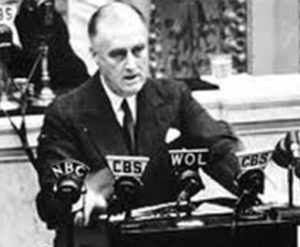
President Franklin D. Roosevelt addressing Congress after the attack on Pearl Harbor.
Roosevelt wove the language of the creation story throughout this particular portion of his address, pitting those who seek to create the world in their own image against those who follow the God who created humans in God’s own image. The United States’ enemies strove to destroy theological doctrine and the United States’ belief in said doctrine. Roosevelt used this threat and the “divine heritage” of faithfulness, fighting in war, to unify the American people in support of war.
Just more than a decade later, on Jan. 20, 1953, in the early years of the Cold War, new President Dwight D. Eisenhower picked up on similar motifs, thematically framing his speech in the contrast of darkness and light. While Eisenhower does not use the same language of “divine heritage” as Roosevelt, he does refer to a “long pilgrimage from darkness towards the light,” indicating a history of having to fight to “secure peace in the world.”
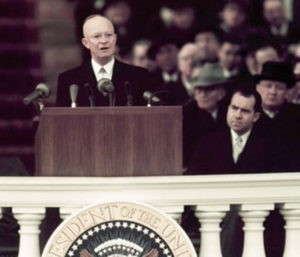
President Dwight D. Eisenhower giving his inaugural address in 1953.
Eisenhower is careful in this speech to blur the lines between faith in God and faith in the United States. While he asks on behalf of the American people for God’s guidance and calls the country to “give testimony in the sight of the world to our faith,” he makes calculated moves for listeners to convert to faith in the United States, which he assures is divinely blessed, “a conscious renewal of faith in our country and in the watchfulness of a Divine Providence. The enemies of this faith know no god but force, no devotion but its use.”
Eisenhower watered the seed that Roosevelt planted 11 years earlier. Roosevelt laid the groundwork for enemies of the United States to be labeled as enemies of “the faith.” While he never explicitly used the same language as Eisenhower, he made statements of what the enemies threatened: theological doctrine and belief. Eisenhower took it a step further to say the enemies are enemies of the “faith.” However, it is important to keep in mind, “faith” is no longer referring to the Christian religion. Eisenhower has stealthily moved from the Christian religion to the American civil religion, equating faith in God to faith in country.
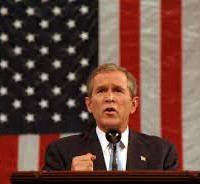
President George W. Bush addressing Congress after the 9/11 attacks.
The Sept. 11, 2001, terrorist attack on United States soil was the first domino in a 20-year line leading to the attack on the Kabul airport on Aug. 26 this year. The response to 9/11 was the War on Terror, with the United States invading Afghanistan. In the days after the 9/11 attacks, President George W. Bush gave a speech laden with religious rhetoric, calling the attacks a “new kind of evil” and deeming the imminent War on Terror a “crusade.”
By invoking the term “crusade,” Bush identified what would become almost a 20-year war (and counting) as a holy war, establishing the Pax Americana, furthering the American Empire, and grafting it to the Christian war tradition.
Religious language also is an integral part of the oath of enlistment and oath for commissioned officers in the United States Military. All enlisted persons make the same oath:
I, _____, do solemnly swear (or affirm) that I will support and defend the Constitution of the United States against all enemies, foreign and domestic; that I will bear true faith and allegiance to the same; and that I will obey the orders of the President of the United States and the orders of the officers appointed over me, according to regulations of the Uniform Code of Military Justice. So help me God.
The usage of the word “faith” and the petition for God’s help as the final statement further confuse and blend the separate entities of God and the United States and its military. Every member of the military must take this oath to serve. However, enlistees and officers may request a secular version of the oath, omitting “So help me God” (although the Air Force did not allow this omission until September 2014).
“There is a reason United States presidents use religious language to speak about the actions of the United States military.”
According to a 2019 report for the Congressional Research Service, 71.7% of active-duty personnel identify as Christian (32.6% no denomination, 19.9% Catholic, 17.9% Protestant, 1.3% Mormon). The other 28.3% of active-duty personnel identify as atheist or agnostic (2.3%), various Eastern religions (0.8%), Jewish (0.4%), Muslim (0.4%), and other, unclassified or unknown (24.4%).
Therefore, it is safe to assume that the majority of military members have sworn to serve only by the help of God. On the one hand, it is a genuine plea for help on the part of the individual, who may or may not realize the gravity of the invocation, making the vow. On the other, it is an intentional move by the United States military to reiterate the divine guidance and sanction they have bestowed upon themselves.
There is a reason United States presidents use religious language to speak about the actions of the United States military. There is a reason religious language is part of the oath taken to serve in the military. It is no accident. It is not a symbol of devout faith. It is an intentional move to garner the American people’s unity and support of the military.
If the actions of the American military are divinely sanctioned calls defending theological doctrine and belief, defending the very faith, then to be against United States military action and to be against American war is to be against God.
President Biden was wrong to conflate divine faith with military action, but sadly, he is not the first president to do so.

Leigh Curl-Dove
Leigh Curl-Dove is a graduate of Duke Divinity School who currently serves as discipleship coordinator at First Presbyterian Church of Greensboro, N.C. She recently completed two years of pastoral residency at Wilshire Baptist Church in Dallas.
Related articles:
New book recalls story of challenging mandatory chapel at U.S. military academies
Christian nationalism deeply embedded into American life, Tyler warns

